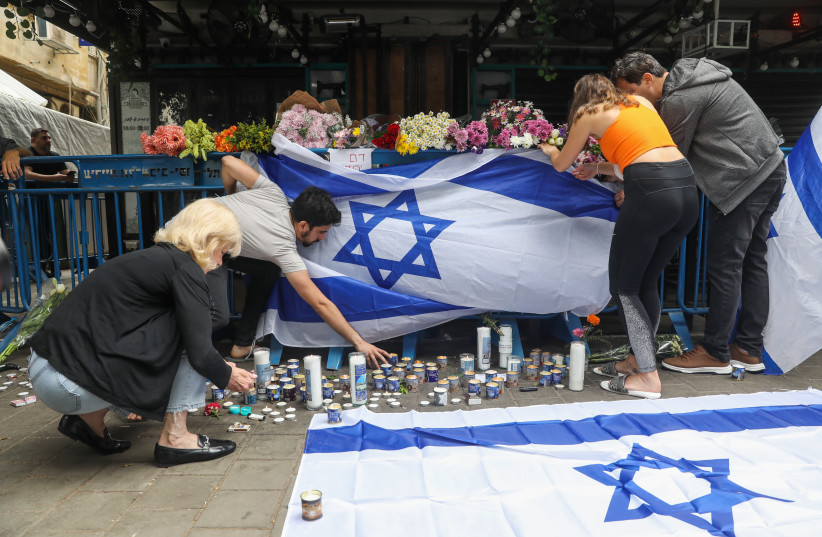Israeli security forces are once again cracking down on terrorism, with forces being bolstered and offensive operations in West Bank towns and cities being carried out around the clock.
Following four deadly terror attacks, the IDF has sent 14 battalions to the West Bank and Seam Line to reinforce troops. That increase has allowed special forces and elite IDF units to operate in Jenin, Hebron, Nablus and surrounding villages.
Despite heavy gunfire by armed Palestinians who engage the soldiers, these troops are arresting terrorist operatives and confiscating their weapons.
Dozens of Palestinians have been arrested in the last few weeks, dozens more have been injured, and several have been killed by IDF fire.
These raids are an attempt by security forces – IDF, Border Police and the Shin Bet (Israel Security Agency) – to thwart additional attacks inside Israel.

The throwing of stones or Molotov cocktails or the firing toward troops are not new to the IDF, and those attacks in the West Bank have led to countless fatalities. But the amount of deadly attacks on the other side of the Green Line is a reality that Israel is not willing to accept.
In less than one month, 14 Israelis have been killed in onslaughts in Beersheba, Hadera, Bnei Brak and Tel Aviv; and despite the offensive moves carried out by the military, the attacks in Israel just keep on coming – the latest happening early Tuesday morning in Ashkelon, where an Israeli police officer was stabbed by a Palestinian from Hebron.
There’s no better way to say it: Israel is once again in the middle of a wave of attacks targeting security forces and civilians.
But it’s Israel. And this country has gone through waves upon waves of terror, wars and intifadas before. Even in the harshest environment, with a much higher death toll, the country was able to beat back terrorism more than once.
The wave in which Israel currently finds itself is not an intifada – but it is more complicated to overcome.
Similar to the “stabbing intifada” of 2015-2016, the attacks now are carried out by lone wolves who are not on the radar of the security establishment, and who have been able to cross through holes in the security fence to carry out deadly attacks using military-grade weapons.
It comes at a time when the security establishment does not want to enter into another conflict, not only because of the current political chaos, but it’s been less than a since the IDF launched Operation Guardian of the Walls against the Gaza Strip in response to rockets fired toward Jerusalem by Hamas.
Over a dozen Israelis were killed, and hundreds of Palestinians inside Gaza. It was an 11-day conflict that allowed Hamas to connect Jerusalem to the blockaded enclave, and one that has made the terror group focus more on the West Bank, and among Israeli-Arabs instead of on the heavily damaged Strip.
WHILE HAMAS has been encouraging violence, it is groups like Palestinian Islamic Jihad that are the major concern this time around.
The IDF has focused its sights on the northern West Bank, specifically on stopping terror coming from Jenin, where PIJ has strong backing, and from where the Tel Aviv and Bnei Brak attackers came.
Both Prime Minister Naftali Bennett and Defense Minister Benny Gantz have stressed that there are no restrictions on the operations of security forces, but Israel is acting in a careful manner in order not to further fan the flames.
Jenin and its refugee camp is one of the more violent cities in the West Bank, with heavily armed terrorists from PIJ and other groups. Dozens of Palestinians have been arrested so far, and during every arrest raid, those heavily armed terrorists have opened fire on Israeli forces leading to Palestinian casualties.
Like other terrorist groups, PIJ has warned that the blood of their operatives will be answered.
And in this region, revenge is usually served with rockets.
PIJ along with Hamas and al-Aqsa Martyrs Brigade engaged IDF troops who came to arrest suspects, and have published a video warning the IDF about entering Jenin.
Israeli officials understand that Hamas is not interested in any conflict; their concern is that the violence might spiral and lead to other terror groups in Gaza launching rockets into Israel, thus dragging the country into yet another war.
Though Hamas has seemingly been cracking down on PIJ operatives in Gaza, even reportedly stopping them from firing rockets, the terrorist group that is in charge of Gaza can decide when one body is too much, and also turn a blind eye to the rockets launched in return.
Their achievement from last year’s war has made the connection between Jerusalem, the West Bank and the Gaza Strip even stronger.
Any descent into violence and chaos across the Green Line will ultimately affect Gaza and the streets of Israeli-Arab towns as well.
Israel understands that, and Defense Minister Benny Gantz has said that there will continue to be a balance between the country’s security policy, while allowing Palestinians to continue to work in Israel.
That balancing act, which is also in place in the Gaza Strip (about 20,000 work permits are in place for Gazans), is what Israel is building on to lower the tension and prevent war.
But confidence-building measures don’t work for terrorist groups, and for young men who see violence and confronting IDF troops as their raison d’être. Usually reserved for terrorists in the Gaza Strip, the military can “mow the lawn” in Jenin and neutralize the terrorists before they leave their home bases.
However, that only lasts for so long, and can without a doubt push PIJ and Hamas to follow through with their threats. The IDF needs to get the situation in Jenin under control, and without bringing Gaza into the conflict.
This country does not need more rockets.
